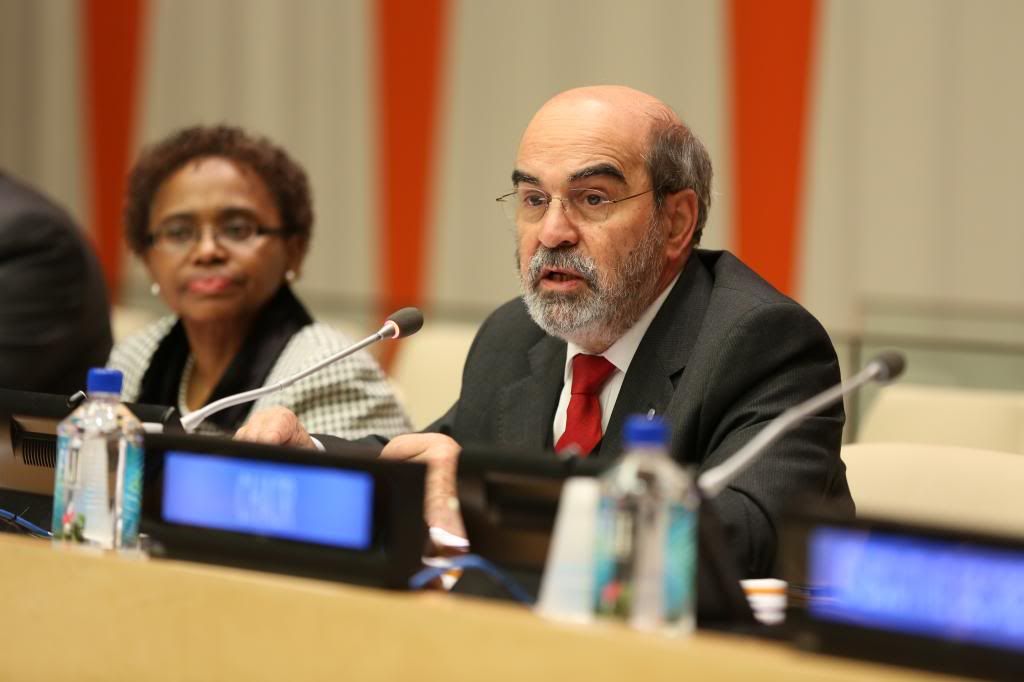Launch of 2014 International Year of Family Farming
22/11/2013

Ladies and gentlemen,
I am honored to speak today on behalf of FAO, IFAD and WFP at the launch of the 2014 United Nations International Year of Family Farming.
We have embraced this collective effort that has grown from a seed planted in 2008 by the World Rural Forum.
The seed has grown with the support of governments, civil society organizations, farmer associations, regional and international organizations, and has flourished in this International Year.
By choosing to celebrate this year, we recognize that family farmers are leading figures in responding to the double urgency the world faces today: improve food security and preserve the natural resources, in line with the Millennium Development Goals, with the debate on the post-2015 development agenda and the Zero Hunger Challenge.
And when I speak of family farmers I also include fisher folks, pastoralists, collectors, indigenous peoples, traditional communities, and many other groups all around the world.
Ladies and gentlemen,
A FAO sample of 93 countries from all regions of the world, show that family farmers make up on average 80 percent of all holdings.
There are an estimated 500 million family farms in the world.
Many things set them apart from large-scale farming.
Their rural activities are managed and operated by a family.
They rely mainly on family labor. Many times they have little more than their own physical strength to harvest the land.
They usually run non-specialized, diversified agricultural activities that give them a central role in securing environmental sustainability and preserving biodiversity.
Because of all this, nothing comes closer to the sustainable food production paradigm than family farming.
And throughout the world, family farmers have a huge productive potential. A potential that, in many cases, has yet to be reached.
Even so, it is encouraging to see that family farming is still the main food provider for billions of children, women and men.
But, strangely enough, they are amongst the world’s most vulnerable population. Let’s not forget that over 70 percent of the food insecure population live in rural areas of developing countries.
The truth is that, in many cases, family farmers were transformed into the subject of social policies. They were considered a problem to be solved.
That is the mindset we need to change.
Family farmers are not part of the problem.
On the contrary. They are part of the solution for food security and sustainable development.
This International Year will help us redeem this sector.
Its results will not only be seen in sustainable and higher food production. But also in the immediate reduction of hunger and extreme poverty.
To do that, we need to reposition family farming at the center of national and regional development programs.
Governments play a key role in leading the support to them.
This includes offering technical assistance and policies that support the productivity increase of family farms; placing appropriate technologies within their reach; improving their access to land and water, credit and markets; and creating an enabling environment for further investments.
There are many ways to support family farming. Different countries have different stories to tell. There is no single right answer.
Allow me to mention just one innovative way that has received growing interest around the world: linking family farming to institutional food purchase programs.
Ladies and gentlemen,
You will hear today about the activities that are being planned for the International Year. Many of them have already begun, such as the regional dialogues on family farming.
FAO has established a Multi-donor Trust Fund to finance initiatives related to the International Year at the global, regional and national levels. I would like to take this opportunity to invite you to contribute to this Fund and thank those that have already done so.
Ladies and gentlemen,
In the eyes of the world, growth, inclusion and preservation are no longer unrelated or optional goals. They are part of the same equation and of the future we want.
Family farming is one of the keys to solve this equation.
That is the rallying call of the International Year of Family Farming. Let’s answer it together.
Thank you for your attention.
